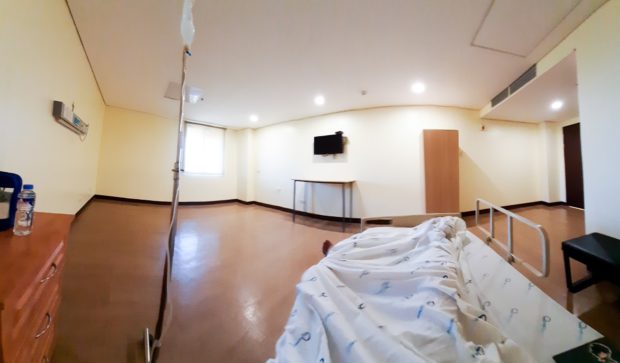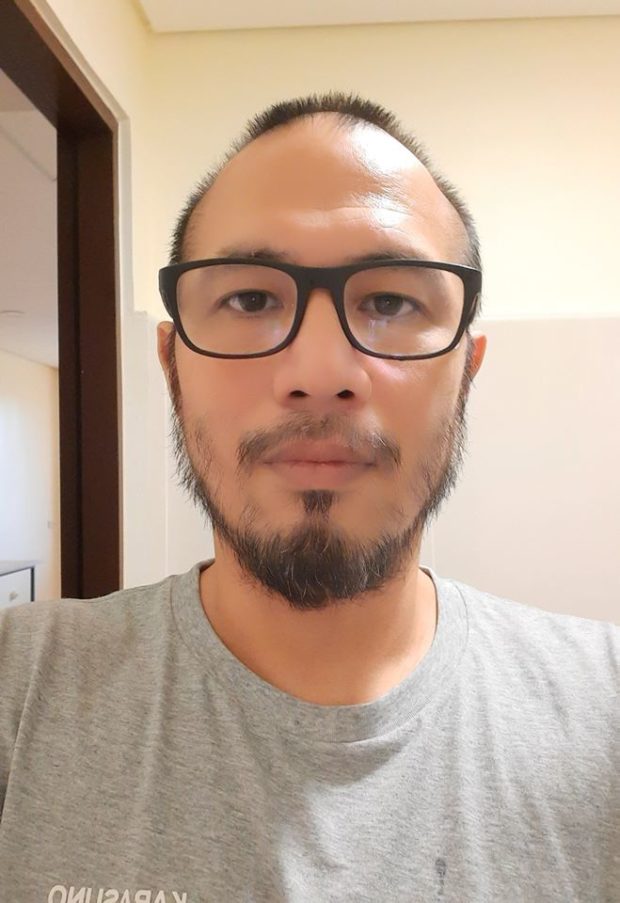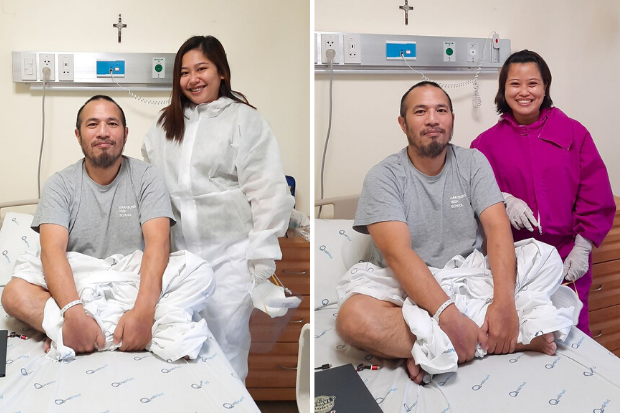Surviving COVID-19: How early intervention saved one man’s life

“I will be forever grateful to Dr. Pasayan, the day he walked into my hospital room without his PPE headgear to give me the good news,” Jo captioned this picture posted on Facebook. Image: Facebook/@jo.avila
MANILA, Philippines — It was during the wee hours of March 16, a day before Luzon went under enhanced community quarantine (ECQ) when professional photographer Jo Avila rushed to the emergency room of a hospital near his home.
He had been suffering from diarrhea for two days at the time and even vomited before going to the hospital. After getting checked and being allowed to rest for two hours with intravenous (IV) tubes attached, he was sent home prescribed with medicine and oral rehydration salts. His stool sample showed no trace of bacteria.
A week later, March 22, Jo was back at the ER. Still suffering from diarrhea, he had since then developed a cough and colds to match. He was labeled by a doctor as a patient under investigation (PUI), but could not be accommodated; the hospital had 20 of their nurses under quarantine.
Jo and his wife turned to other hospitals in Metro Manila and Antipolo, only to find out that most of them were already at full capacity. With the help of his father and older brother, arrangements were made to have Jo picked up by an ambulance from his home all the way to Qualimed in Sta. Rosa, Laguna.
Two days later, he had developed pneumonia, and later on tested positive for COVID-19.
Article continues after this advertisementFast forward almost three weeks later, Jo now finds himself resting inside his home, sharing on Facebook his journey as a survivor of the disease that had felled almost two million people worldwide. His message: it may not be easy, but recovery is highly possible through proper healthcare and early intervention.
Article continues after this advertisementhttps://www.facebook.com/715665500/posts/10163194920940501/?d=n
Early intervention is key
“As soon as we arrived in Qualimed, I was wheeled straight into an isolation room. Blood samples, nasal and throat swabs were also taken from me immediately thereafter. They attached an IV to my left hand, wheeled an X-ray machine into my room and took an X-ray of my chest area. It was the first day and I was left amazed at the efficiency of the hospital staff,” Jo recalled.
He found out he had pneumonia after the results of a CT scan of his lungs came on March 24. On the same day, Jo met Dr. Mark Kristoffer Pasayan, an infectious disease specialist who attended to him.
Even before receiving the results of the swab tests, Dr. Pasayan suspected that Jo had actually contracted the novel coronavirus based on his symptoms. He sought Jo’s consent to proceed with the treatment as if he was already COVID-19-positive.
“He reasoned early intervention is key to successfully treating (COVID-19). If the results come back negative, then the treatment would be stopped and nothing would have been lost,” Jo noted.
After agreeing to the doctor’s advice, something that would eventually prove to be the right move, Jo was then subjected to the daily routine of resting, eating and taking the necessary medicines — on repeat for many days.
Life on a schedule
“I didn’t realize at one point that my life would be ruled by a routine schedule for the coming days,” Jo said, noting his fast-paced life prior to COVID-19.
He would be given breakfast at a certain time along with a pack of several medicines that he had to take by 8 a.m. Lunch would later follow, also with a tablet that he had to take by 2 p.m. Dinner was not any different; it will be delivered to him at a certain time with meds that he would need to take by 8 p.m.
With the daily routine, Jo even memorized what times of the day and night someone would drop by to take his blood oxygen levels, temperature, and blood pressure.
“It became no longer inconvenient to be woken up past midnight because blood had to be taken from me or because someone had to measure my vitals and ask how often had I urinated or taken a poop. This schedule of activities became my new normal and daily routine,” he added.
Insomnia, isolation and things he didn’t want to hear

The hospital room where Jo Avila stayed from March 22, 2020, until his release on April 8, 2020. Image: Facebook/@jo.avila
“One of the hardest things that I had to deal with during my hospital stay was the insomnia and the silence,” Jo said.
As he would spend the day resting, it became difficult for Jo to fall asleep in the evening because he ends up being too well-rested. He kept the bathroom light on with the door slightly open to act as a nightlight, admitting that “it became tiresome staring into the darkness waiting for sleep to come.”
“The silence at the hospital was not deafening. It allowed me to hear more during the night. I could hear a motorcycle traveling along the road outside my window. I could hear cicadas. I could hear the nurses outside in the corridor,” Jo said.
Hearing the nuances of life outside his room also meant hearing the sounds inside the facility, things Jo admitted he didn’t want to hear: “I heard someone coughing loudly as I lay down in bed. I heard what sounded like someone trying to get air into their lungs.”
Despite these ambient sounds, Jo told INQUIRER.net that boredom and isolation brought the loudest sound of silence, which he was able to endure with the help of frontliners of Qualimed.
He said that they “did a lot to take out the fear from the experience” by giving their best to explain the treatment to him each time they entered his room.
Coping with COVID-19

“This is what losing 22 pounds in three weeks looks like along with not being able to cut my hair nor shave,” Jo captioned this image from Facebook.
When the result of the first swab test arrived after seven days, Jo tested positive for COVID-19, but it no longer gripped him with fear as he would have expected since Dr. Pasayan did a good job of softening the blow, Jo said.
The second swab test result also showed that he was positive. Jo needed two negative results to be released from the hospital.
“It would take time for each swab test result to come back. I would openly curse all the government officials and their respective family members who all essentially cut in line to be tested delaying every else who needed testing,” he quipped.
Despite the treatment, battling the disease is no easy task for the human body. Jo developed a fever twice and had experienced convulsing with chills as he tried to fall asleep amid the freezing cold, all the while suffering from diarrhea for three weeks straight.
“I lost 12 pounds during the first three days. I would lose 5 pounds a week during the succeeding two weeks,” Jo said. He explained that according to his doctor, the diarrhea may be a combination of the virus and the cocktail of medicines he was taking.
During the days when he felt well enough to stand, Jo learned how to take a bath and change clothes with IV attached. There were a couple of times, however, that he would be able to take baths without them.
The bathroom sink became Jo’s laundry area, while the shower curtain rod became his clothes line. He had “underestimated” the length of his stay at the hospital, so he had to clean up after himself.
During his 18 days of treatment, Jo also noted how mobile devices helped him cope with the isolation and proved to be most significant for times like these.
“There is a reason why we own mobile devices. Call your family if you need support or just someone to talk to. To the family members, yes we need you to talk to us and tell us about how your day is, what happened at home or what you will be having for dinner. We need the sense of normalcy and support,” he said in an interview.
Modern heroes
Jo had nothing but praises for his nurses and doctors who had helped him recover and made his stay at the hospital bearable.
“I have nothing but praises for the frontliners of (the hospital). They would greet me cheerfully each time they entered my room. I would thank them for taking my vitals, getting my blood sample, bringing me food or changing my IV bottle,” Jo said in the interview.
“They never let on that they were tired. But one nurse did mention that she hadn’t been home in two weeks… You would have to admire the hospital staff for their empathy. A male nurse kept checking on me one evening as I was coping with a fever,” Jo recalled.
He also talked about how the nurses added extra water bottles to his meals after they noticed how he kept on asking for an extra bottle as he was trying to cope with the dehydration from diarrhea. One even advised him to have a relative buy a big bottle of water and deliver it to him so he can cut a few expenses from his hospital bill.
“A female nurse told me that the following day was her day off and offered to buy for me what I needed. She purchased for me a 6-liter bottle of mineral water, fabric conditioner, and laundry detergent. It made me very happy to be able to do my own laundry,” he narrated.
Throughout Jo’s stay, the frontliners at the hospital wore personal protective equipment (PPE) as a safety measure against COVID-19. The very same gear, however, also made their jobs a tad harder, according to Jo.
“The hospital staff would change PPEs several times during my stay. Old ones would be disposed of and everyone would switch to wearing a new set of PPEs,” he noted. “I think that the most difficult part of the PPE to wear would be the plastic face shield. You would see fogging and moisture develop on it as the hospital staff did their job.”
“One nurse was wearing glasses which was fogged along with her face shield. She had trouble seeing as she was trying to insert a needle into my hand. She brought my hand closer to my eyes, pointed to a spot and asked if I saw a vein where she was pointing. I put on my glasses, looked at where she was pointing and informed her that I was just as blind. She did manage to find the vein,” he recounted.
A strange sight

Some of “the many people who took very good care of me at the hospital and to whom I owe a huge debt of gratitude,” according to Jo. Facebook/@jo.avila
When the moment came for Jo’s third swab test results to come in, he finally got what he was hoping for: a negative test result for COVID-19. He then took the fourth test on April Fool’s Day, but he “didn’t want to think of (that day) as a bad omen.”
“I saw a strange sight a few days later. My doctor and two nurses walked into my room with their PPE headgear off. It took me a few seconds to realize that the April 1 swab result had come back negative as well. I was congratulated by Dr. Pasayan and the nurses, photos were taken and I told Dr. Pasayan that I would honor my promise to him,” he said.
Jo, a professional photographer, promised that after the mandatory two-week self-isolation upon release and once the ECQ is lifted, he would return to the hospital to take formal photos with Dr. Pasayan and the hospital staff “who took very good care” of him.
“I am sincerely looking forward to keeping that promise after spending 18 days under their care,” the COVID-19 survivor emphasized.
EDV
For more news about the novel coronavirus click here.
What you need to know about Coronavirus.
For more information on COVID-19, call the DOH Hotline: (02) 86517800 local 1149/1150.
The Inquirer Foundation supports our healthcare frontliners and is still accepting cash donations to be deposited at Banco de Oro (BDO) current account #007960018860 or donate through PayMaya using this link.